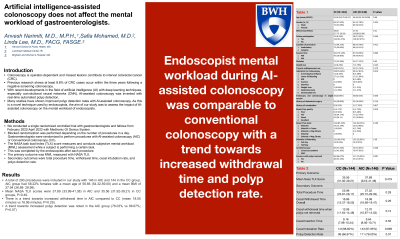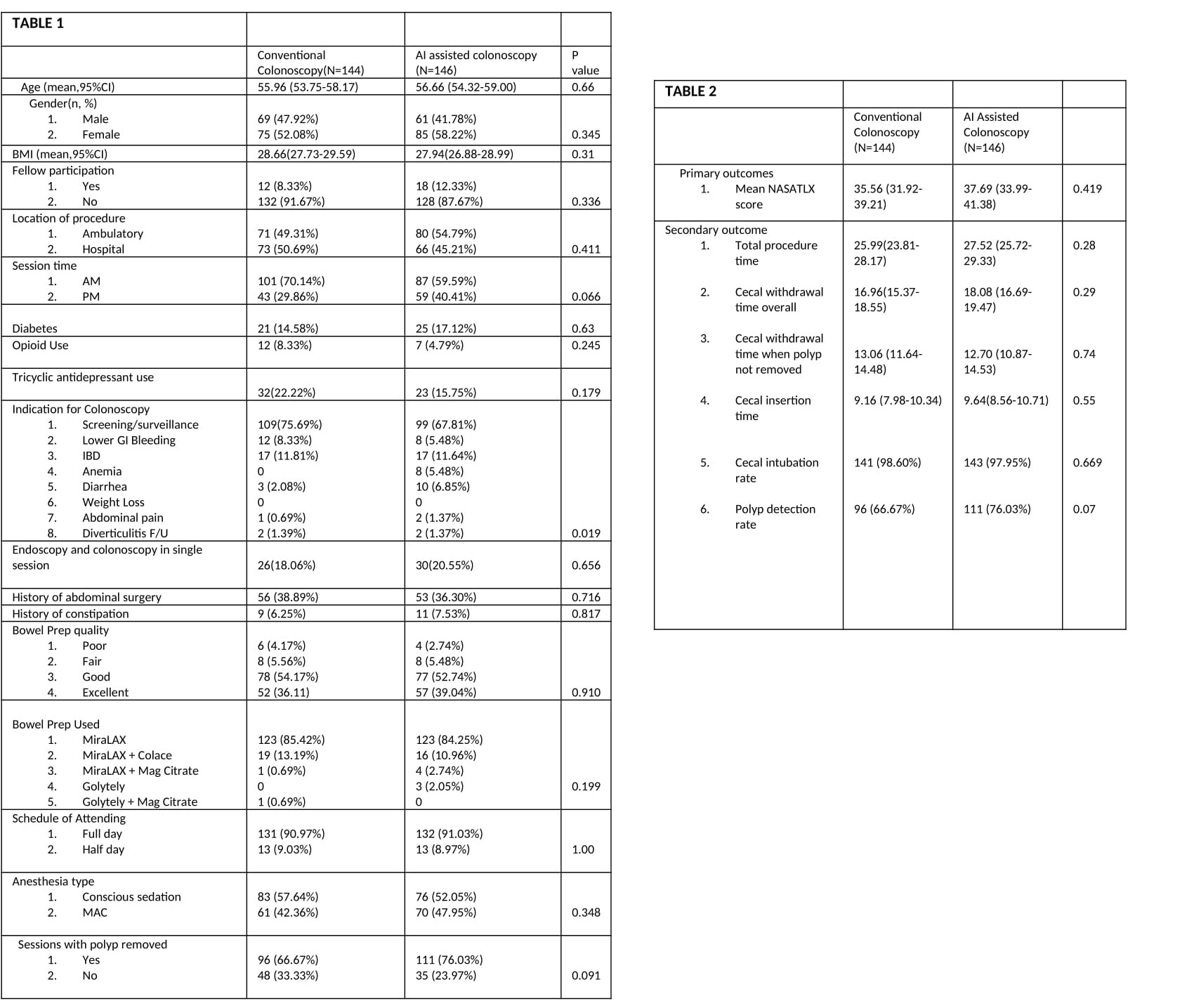Back


Poster Session B - Monday Morning
Category: Colorectal Cancer Prevention
B0177 - AI Assisted Colonoscopy Does Not Affect Mental Workload in Gastroenterologists
Monday, October 24, 2022
10:00 AM – 12:00 PM ET
Location: Crown Ballroom

Has Audio

Anvesh Narimiti, MD
Brigham and Women's Hospital
Worcester, MA
Presenting Author(s)
Anvesh Narimiti, MD1, Safia Mohamed, MD1, Linda Lee, MD2
1Brigham and Women's Hospital, Worcester, MA; 2Brigham and Women's Hospital, Boston, MA
Introduction: Colonoscopy is operator-dependent and missed lesions contribute to interval colorectal cancer (CRC). Previous research shows at least 8.6% of CRC cases occur within the three years following a negative screening colonoscopy. With recent developments in the field of artificial intelligence (AI) with deep learning techniques, especially convolutional neural networks (CNN), AI assisted colonoscopy was invented with real time automated polyp detection. Many studies have shown improved polyp detection rate with AI assisted colonoscopy. As this is a novel technique used by endoscopists, the aim of our study was to assess the impact of AI assisted colonoscopy on the mental workload of endoscopists.
Methods: We conducted single center randomized controlled trial with gastroenterologists and fellows from Feb 2022-April 2022 with Medtronic GI genius system. Blocked randomization was performed depending on the number of procedures in a day. Gastroenterologists were randomized to perform procedure with AI assisted colonoscopy (AIC) or conventional colonoscopy (CC). The NASA task load index (TLX) score measures and conducts subjective mental workload (MWL) assessment while a subject is performing a certain task. This was completed by the endoscopist after each procedure. Primary outcome was MWL measured with NASA TLX, and secondary outcomes were total procedure time, withdrawal time, cecal intubation rate and polyp detection rate.
Results: A total of 290 procedures were included in our study with 146 in AIC and 144 in CC group. AIC group had 58.22% females with mean age 56.66 (54.32-59.00) and mean BMI 27.94 (26.88- 28.99). This was comparable to patients in CC group. Location of procedure (at hospital versus ambulatory endoscopy center), session time (AM versus PM), fellow participation, patients with history of diabetes, opioid use, tricyclic antidepressants, history of abdominal surgeries, history of constipation, bowel prep quality, type of sedation were similar between the two groups. Mean NASA TLX scores were 37.69 (33.99-41.38) in AIC and 35.56 (31.92-39.21) in CC groups, P=0.49. There is a trend towards increased withdrawal time in AIC compared to CC (mean 18.05 minutes vs 16.96 minutes; P=0.29). A trend towards increased polyp detection was noted in the AIC group (76.03% vs 66.67%; P=0.07).
Discussion: Endoscopist mental workload during AI-assisted colonoscopy was comparable to conventional colonoscopy with a trend towards increased withdrawal time and polyp detection rate with AI.

Disclosures:
Anvesh Narimiti, MD1, Safia Mohamed, MD1, Linda Lee, MD2. B0177 - AI Assisted Colonoscopy Does Not Affect Mental Workload in Gastroenterologists, ACG 2022 Annual Scientific Meeting Abstracts. Charlotte, NC: American College of Gastroenterology.
1Brigham and Women's Hospital, Worcester, MA; 2Brigham and Women's Hospital, Boston, MA
Introduction: Colonoscopy is operator-dependent and missed lesions contribute to interval colorectal cancer (CRC). Previous research shows at least 8.6% of CRC cases occur within the three years following a negative screening colonoscopy. With recent developments in the field of artificial intelligence (AI) with deep learning techniques, especially convolutional neural networks (CNN), AI assisted colonoscopy was invented with real time automated polyp detection. Many studies have shown improved polyp detection rate with AI assisted colonoscopy. As this is a novel technique used by endoscopists, the aim of our study was to assess the impact of AI assisted colonoscopy on the mental workload of endoscopists.
Methods: We conducted single center randomized controlled trial with gastroenterologists and fellows from Feb 2022-April 2022 with Medtronic GI genius system. Blocked randomization was performed depending on the number of procedures in a day. Gastroenterologists were randomized to perform procedure with AI assisted colonoscopy (AIC) or conventional colonoscopy (CC). The NASA task load index (TLX) score measures and conducts subjective mental workload (MWL) assessment while a subject is performing a certain task. This was completed by the endoscopist after each procedure. Primary outcome was MWL measured with NASA TLX, and secondary outcomes were total procedure time, withdrawal time, cecal intubation rate and polyp detection rate.
Results: A total of 290 procedures were included in our study with 146 in AIC and 144 in CC group. AIC group had 58.22% females with mean age 56.66 (54.32-59.00) and mean BMI 27.94 (26.88- 28.99). This was comparable to patients in CC group. Location of procedure (at hospital versus ambulatory endoscopy center), session time (AM versus PM), fellow participation, patients with history of diabetes, opioid use, tricyclic antidepressants, history of abdominal surgeries, history of constipation, bowel prep quality, type of sedation were similar between the two groups. Mean NASA TLX scores were 37.69 (33.99-41.38) in AIC and 35.56 (31.92-39.21) in CC groups, P=0.49. There is a trend towards increased withdrawal time in AIC compared to CC (mean 18.05 minutes vs 16.96 minutes; P=0.29). A trend towards increased polyp detection was noted in the AIC group (76.03% vs 66.67%; P=0.07).
Discussion: Endoscopist mental workload during AI-assisted colonoscopy was comparable to conventional colonoscopy with a trend towards increased withdrawal time and polyp detection rate with AI.

Figure: Table 1 and Table 2
Disclosures:
Anvesh Narimiti indicated no relevant financial relationships.
Safia Mohamed indicated no relevant financial relationships.
Linda Lee indicated no relevant financial relationships.
Anvesh Narimiti, MD1, Safia Mohamed, MD1, Linda Lee, MD2. B0177 - AI Assisted Colonoscopy Does Not Affect Mental Workload in Gastroenterologists, ACG 2022 Annual Scientific Meeting Abstracts. Charlotte, NC: American College of Gastroenterology.
